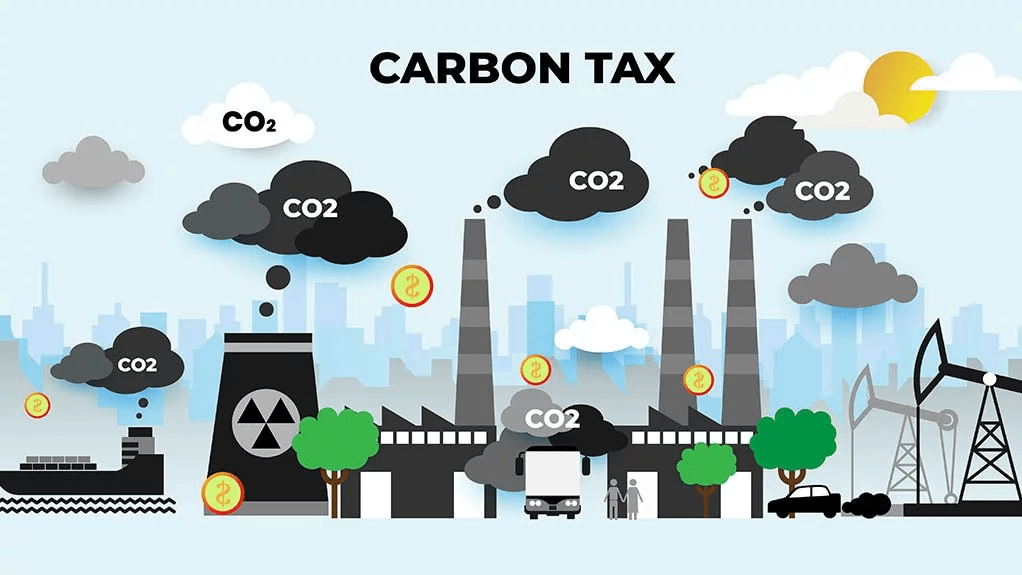In Short : Finance Minister Nirmala Sitharaman criticizes attempts to impose a carbon tax, deeming such moves as ‘not moral at all.’ This stance suggests a perspective on the ethical considerations surrounding carbon taxation and reflects the complexity of balancing economic and environmental policies.
In Detail : “Cross-border imposition (of tax) and that money going towards somebody else’s green agenda, if anything, is not moral at all,” Sitharaman told the CII Global Economic Policy Forum.
Finance Minister Nirmala Sitharaman Thursday said any move to levy carbon tax by developed countries to meet their green commitments would be morally wrong and goes against the interest of developing countries of the ‘Global South’. She was referring to the European Union’s proposal to impose tax under the Carbon Border Adjustment Mechanism (CBAM).
“Cross-border imposition (of tax) and that money going towards somebody else’s green agenda, if anything, is not moral at all,” Sitharaman told the CII Global Economic Policy Forum.
The minister said every country will need to generate resources to meet the green commitments made globally.
The CBAM, or carbon tax, as an import duty will come into effect from January 1, 2026. But from October 1 this year, domestic companies from seven carbon-intensive sectors, including steel, cement, fertiliser, aluminium and hydrocarbon products, were required to share data about carbon emissions with the EU. According to some estimates, the CBAM will result in an additional 20-35 per cent duty on exports.
During India’s G20 presidency in 2023, a G20 report identified climate risks and included pricing and non-pricing tools to tackle climate change. It emphasised that the transition has to be inclusive and should not rely only on taxes.
In her address, Sitharaman said the base energy requirements of a country cannot be filled by renewable energy sources, but it is possible to think in terms of spreading renewable energy in such a way that individual participation is ensured.
The Finance Minister also said that India is rapidly moving in the renewable energy space, particularly in solar, and is in talks with many countries for grid connectivity across the world by the International Solar Alliance members.
On the healthcare front, Sitharaman said there is a need for sharing of knowledge, establishing more centres which produce more affordable medicines all over the world along with making movement of patients across countries more flexible.
When asked about her advice to corporate leaders on artificial intelligence, Sitharaman said she will certainly encourage them to adapt to using AI and to take “industrial revolution 4.0 seriously”. “I would want them to be sure that in their planning for short term, medium term, and long term, AI and Web3 are all taken in the right spirit to improve productivity, to improve efficiency and to make sure that you are able to take monotony out of due diligence. You need to have due diligence, compliance but maybe AI will help you to do it smartly. For all these purposes, Indian executives will have to give good quality time to infuse AI in their scheme of things,” she said, adding that industry needs to work closely with the government as institutional arrangements are being made with public funds such as setting up of three centres of excellence for AI. She, however, noted that industry should be sure to watch over that AI is used ethically.
On discussions about a currency alternative to the US dollar, Sitharaman said it is a very sensitive issue and an issue of concern for many countries particularly the Global South. “We have actually facilitated many countries in engaging with India using the rupee because the rupee at least has been very stable against most currencies, particularly against the US dollar. Globally revealed data shows that the rupee has held itself up strongly against the dollar…some countries in South Asia and Africa have already started to have rupee trade. With Russia, we have had rupee trade earlier, now we have a different type of mechanism through which we are facilitating rupee trade…on the larger issue of which currency will it be if not US dollar, there is a lot of discussion, thought process to be taken…it’s not going to be an immediate thing, it’s a thought there, it’s floating around, we will see how that is going to work out,” she said.

